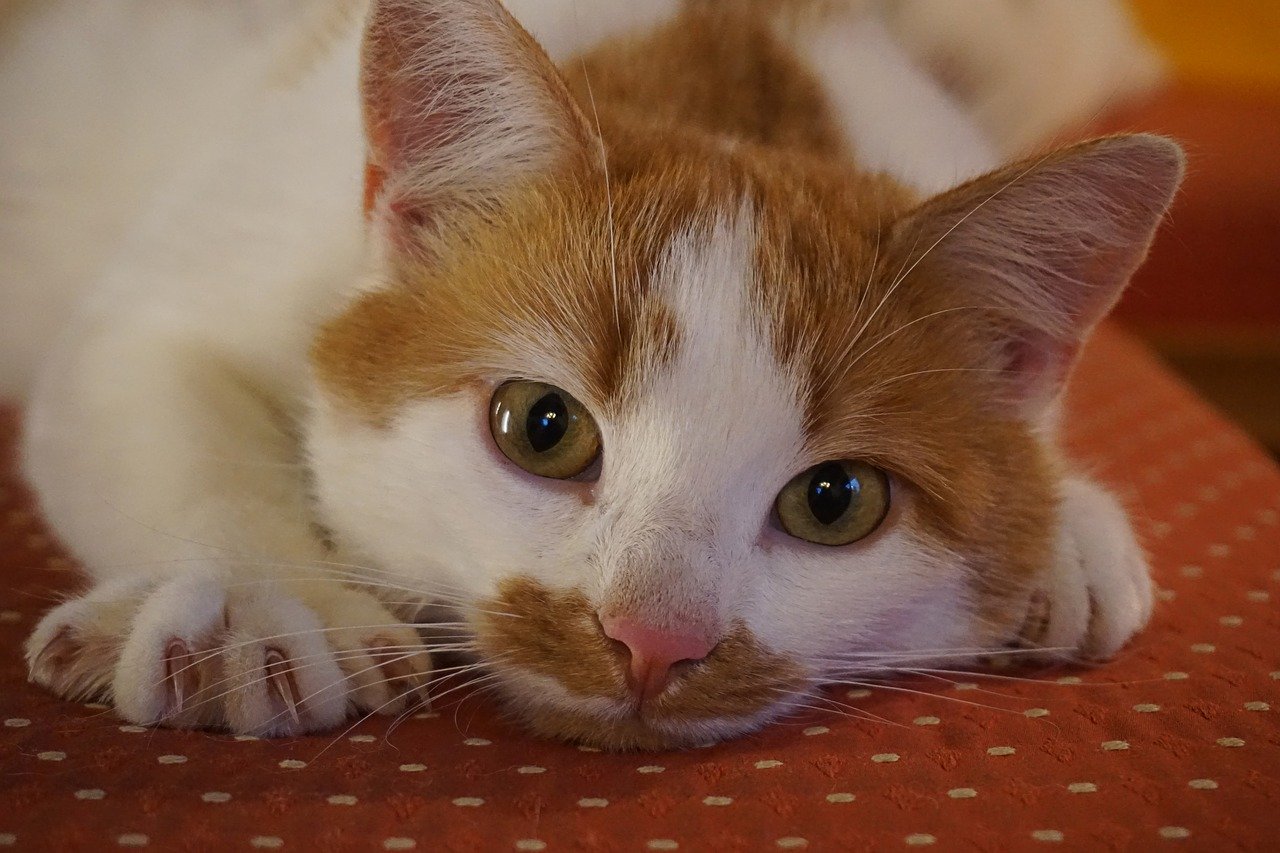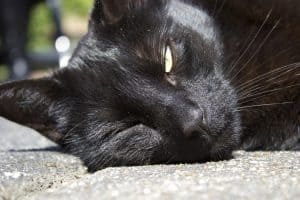If your old cat is really clingy all of a sudden, it may be suffering from feline cognitive dysfunction. Alternatively, it may be trying to tell you that there’s a medical issue that ought to be addressed. To learn the cause, it’s best to take the feline to the vet and explain any changes in its behavior, as well as any other red flags you may have noticed.
My Old Cat Is Really Clingy All of a Sudden
Most of us are pretty used to our feline friends acting all aloof and barely being interested in who we are or why we’re trying to pet them. That’s what makes any sudden neediness so strange and, to be perfectly honest, worrisome for most cat owners, especially those with a mature feline. When an old cat is really clingy, the cause is, unfortunately, most often grim.
Does that mean that there isn’t anything to be done about it? Of course not! Even though it’s likely that your old cat is really clingy as it senses the end is near, you should do whatever you can to make the rest of its life as nice as possible. But first, let’s examine the root cause of the behavior.
Old Cat Is Really Clingy and Needy: The Underlying Cause
Today, science has come so far that we can expect our cats to live longer than usual. More often than not, they can live for about 16 years, with some well-cared-for felines reaching an even older age (20+)!
However, just because a cat can live long doesn’t mean its senior years will be pleasant. Unfortunately, old age can influence a feline as much as it influences us, humans. Dementia and general disorientation are quite common in the elderly. In the cat world, that’s feline cognitive dysfunction.
If your furry friend is somewhere between eleven and fourteen years old, it is actually a senior feline, which puts it at a higher risk of losing some of its cognitive functions. This loss of normal abilities is often accompanied by various symptoms, including changes in behavior. In essence, your old cat is really clingy because its vitals are slowly shutting down. It’s now relying on you to guide it through the rest of its life.
If Your Old Cat Is Really Clingy — It Might Be Its Time to Go
Feline cognitive dysfunction encompasses a variety of behavioral changes, including:
- Sudden house soiling (the cat is peeing or pooping outside the litter box)
- Spatial and temporal disorientation and confusion (the feline doesn’t know where it is or what time it is)
- Increased anxiety and irritability
- Inappropriate vocalization, especially at night
- Different sleep-wake cycle
Though the cat may have an increased need for attention from its owner, it may actually become more aggressive toward other animals in the household. Furthermore, its grooming and eating habits may change too. Suddenly, its appetite may decrease (most often) or increase (rarely), and it may stop cleaning itself as often as it used to.
With general spatial disorientation comes the inability to take part in various activities. The cat may have loved playing with its toys every single day. Now, however, all it does is pace around and wander without any purpose.
On top of that, the feline may display some memory problems too. Cognitive dysfunction may prevent it from following simple commands, as it keeps forgetting them. That’s why it may be relieving itself outside the litter box too — it has forgotten its training.
Other Potential Causes
If your feline companion is old and it is exhibiting strange behavior, it’s likely that its cognitive functions are becoming weaker every single day. However, before reaching that conclusion, you should definitely visit the vet. Unfortunately, these behavioral changes may be the result of some diseases, such as:
- Diabetes mellitus
- Hyperthyroidism
- Chronic renal failure
- Urinary tract disease
- Arthritis
- Dental disease
- Cancer
Granted, not all of these conditions will make the cat cling to you like Velcro, which is why ruling them out before jumping to any conclusions is a must. The vet will be able to do some blood work and determine the right treatment in case the condition is serious.
If you have ruled out medical issues, cognitive dysfunction is likely the answer. Unfortunately, the condition isn’t treatable. What you can do is make the remaining years of your cat’s life a bit better. Here’s how to do that.
What to Do If Your Old Cat Is Really Clingy
Cognitive dysfunction is challenging for humans, let alone animals that somewhat depend on us for some of their basic needs. Therefore, if your cat is simply going through the natural aging process and is suddenly unable to remember where to go to the bathroom or when it’s time to eat — don’t be hard on it.
Felines are skilled creatures, and they aren’t likely to stop caring for themselves suddenly if they don’t have a valid reason. Therefore, it’s time to help your cat out a bit.
Ask the Vet for Help
There isn’t a treatment that could cure cognitive dysfunction and essentially prolong the life of your cat. However, some medications could make it all easier on the feline.
Selegiline hydrochloride (you may find it under its brand name Anipryl®) is supposed to affect brain function and boost dopamine levels. As a result, many of the diminished cognitive processes should be augmented with the help of this medication. Two selegiline metabolites, amphetamine, and methamphetamine may also do wonders when it comes to increasing brain activity in cats.
If you cannot get your hands on this medication, here’s what else you can do to help your cat feel better:
Make Helpful Changes to the Cat’s Environment
The keyword here is “helpful,” as not all changes will be good for the cat. In fact, any sudden life-changing events may make it more anxious, so remember to keep those to a minimum. In a cat’s life, that’s changing the position of its bowls or bed, for instance, or bringing another animal home.
What you can do, though, is try to naturally increase the cat’s brain activity by offering more mental stimulation. You should spend more time with the cat and interact with it by playing all sorts of games. Consider getting it some puzzle toys or puzzle feeders that will make it rack its brain a bit to get to the treats.
Again, keep in mind that you shouldn’t stress the cat. If your old cat is really clingy and has already lost most of its cognitive functions (it’s disoriented most of the time, cannot use the litter box, etc.), it’s best to leave it alone and just provide it with lots of love. Some cats may even like reducing interactions with other humans or animals. They may even be happier in a room of their own, where they can relax in peace.
Change Its Diet Ever So Slightly
As said, any sudden strange changes may make matters worse. However, since it has been noted that antioxidants may help improve cognitive function in cats, there’s no harm in trying to switch up the cat’s food.
When looking through the ingredients and benefits of the food, pay attention to vitamins C and E. These are potent antioxidants that are supposed to protect the brain from harm, i.e., free radical damage.
In fact, a study from 2002 done on dogs showed that antioxidants could reduce cognitive dysfunction in senior dogs, essentially turning back the time in their brains. Even though the study hasn’t been done on cats, we can consider these results promising in terms of felines as well, at least until we get our hands on additional research.
Apart from antioxidants, it would be wise to incorporate omega-3 fatty acids, luteolin, and B vitamins into the cat’s diet. All of these could play a role in restoring a cat’s memory and other brain functions.
Final Thoughts
Although it pains me to say it, if your old cat is really clingy, there is a chance that it may leave you soon. We would all love it if our pets could live forever. In the end, though, we have to make peace with the fact that their bodies function differently than ours.
That’s not a reason to give up on your cat and wallow in your grief. Before jumping to conclusions, remember to check with the vet if there are any other reasons your old cat is really clingy all of a sudden. If there aren’t and its cognitive abilities have simply diminished due to old age, now you know how to improve the final years of its life. You still have time to shower it with love — start right now!
[su_box title=”Affiliate Disclosure”]This website is supported by its readers. Please assume that all links are affiliate links. If you make a purchase from one of the links we will make a commission from Amazon. Thank you.[/su_box]








